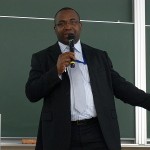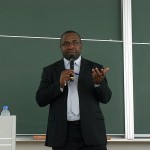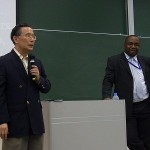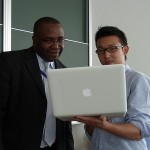2010年度法政大学法学部
Global Governance
■テーマ : 「Global Neighborhood or Global Apartheid」
■講 師 : Obijiofor Aginam氏PhD, Director of Studies, United Nations University
■日 時 : 2010年6月16日(水) 13:30~15:00
■場 所 : 法政大学市ヶ谷キャンパス 外濠校舎 307教室
■作成者 : 大山 諒佑 法政大学法学部国際政治学科3年
***************************************
<Ⅰ.講義概要>
1.Overview of Africa
(1)If you look at the world today, from Africa to Europe to Asia to Latin America, there are a lot of inequalities. There are so many people who live on less than one dollar a day. They cannot afford the basis of life such as food, shelter, and medicines. On the other hand, countries like the United States, Europe, Japan and Canada are very wealthy. That is why I call it “Global Apartheid.” In the middle, there are countries like China, Brazil, South Korea and India for instance, that are now called emerging powers or emerging economy power. Therefore, we live in a divided world. This world is divided according to levels of development.
(2)There are 54 different countries in the African region. They have a lot in common because of Arabic and Islam cultures. A number of African countries were colonized by European countries such as Britain, Portugal, and France. In the case of Nigeria, is English Speaking country because they were colonized by Britain. This huge continent was formed through political and historical circumstances.
(3)About one billion people are living in Africa. Throughout Africa, there are approximately 1,000 different languages; Nigeria has 150 languages for instance. This is not similar to Japan where everyone speaks one official language. Climates are different according to the place from tropical forest to Sahara desert, Savanna and huge rain forest. It can be said that Africa is very diverse continent in terms of languages, types of climate and political and historical systems.
2.Historical and Political Changes
(1)Africa actually have various political systems. The colonialism started in the late 19th century by European Imperial Powers such as France, Britain and Portugal. They came into Africa and colonized the continent. Before that time, there were over 10,000 autonomous political entities. At that time, that had been so different from what they became like after Europeans came and colonized the continent. France and Britain were major empires and concurred and established a lot of African territories.
(2)The colonialism destabilized ethnic, cultural and linguistic affinities and the impact still felt in African politics. Once they came to power, they went to conference in Berlin in 1885 so-called Berlin Conference. The conference regulated European colonization and trade in Africa during the New Imperialism period.
(3)During 1960s and 70s, most of these African colonies became political independent because of the pushing by the United Nations and international communities and European countries granted the political independent. New independent countries established their new government.
(4)After they became independent, there was the cold war between the United States and the Soviet Union: capitalism and socialism. Ghana’s president Nkurumah was assassinated by Cold War politics. Africa was in the middle of the war as American economist Jeffery Sachs wrote in “End of Poverty” as “As soon as the colonial period ended, Africa became a pawn in the cold war.”
3.Economic Independence
(1)After African countries became independent, it was obvious that political independence needed to be supported with economic independence and economic self-determination. A group of 77 developing countries called G77 formed themselves very strong alliance at the United Nations and started to agitate what is called New International Economic Order (NIEO). They needed to address fundamental economic problems. The G77 was founded by the third world states and they supported each other.
(2)This was one of the achievement of G77 and they championed the establishment of the United Nations Conference on Trade and Development (UNCTAD) in 1964. What UNCTAD does is to provide technical assistance from tailor to the specific requirements of developing countries, with special attention to the needs of the least developed countries and of economic in transition.
(3)NIEO was also the one of the G77’s achievement. It has proved that impossible to achieve an even and balanced development of the international community under the existing international economic order because the world is divided into wealthy and poor.
(4)The Charter of Economic Rights and Duties of States in 1974 affirmed the need to strengthen international cooperation for development, including fundamentals of international economic relations in Charter 1 of the Charter.
(5)Apart form G77, there are other strategic alliances by developing countries. For example, there was what is called The South Commission and reported “Three and half billion, three quarters of all humanity, live in the developing countries. Together the developing countries accounting for more than two thirds of the earth’s land surface area are often called the Third World.” We refer to them as the South. Largely bypassed by the benefits of prosperity and progress, they exist at the periphery of the developed countries of the North.”
(6)While most of the people of the North are affluent, most of the people of the South are poor; while the economies of the North are generally strong and resilient, those of the South are mostly weak and defenseless; while the countries in the North are, by and large, in control if their destinies, those of the South are very vulnerable to external factors and lacking in functional sovereignty.
4.WTO
(1)Development is about everything. You need infrastructure, conditions such as an access to health facilities, safe water and most importantly food. WTO negotiates trade agreements. If some country violates the contract, there is a lot of consequences for that violation. I would like to talk about the WTO is the access to medicines for HIV and AIDS that are big issues in African continent.
(2)WTO was set up in 1995. Before that the rules of international governments’ trade was called General Agreement on Trade and Tariffs (GATT).
(3)Global governance questions on access to ARV drugs, and the globalization of IP rights, especially by the WTO agreements have exacerbated the tension between the most basic human right (Right to Life), and right to profit from scientific inventions.
(4)We know that there are very high infection rates of HIV and AIDS in Africa. Globally, over 45 million cases can be seen since 1980s. Disproportionate infection rate and prevalence of AIDS between the developing and developed regions of the world raises moral and ethical questions about the global framework for its prevention, control, and treatment. It is a very big issue to most developing countries. It is not yet curable but it is treatable.
(5)In order to boost the people who can access to medicines, there are parallel imports, and compulsory licensing. Parallel imports allow for the importation of patented products without the authorization of the patent holder. Parallel importation allows a country to “shop around” for lower prices of the same patented product anywhere it may be found in the global market. On the other hand, compulsory licensing allows a government to authorize local firms to produce generic versions of patented drugs, often used during emergencies.
(6)In 1998, 48 pharmaceutical companies challenged a South African legislation as violation of TRIPS agreement. Legislation in question “introduces a legal framework to increase the availability of affordable medicines in South Africa… through generic substitution of off-patent medicines, transparent pricing for all medicines, and parallel importation of patented medicines.”
(7)Brazil is often cited as a “success story” and “model” for developing countries. The U.S. launched a dispute settlement process against Brazil at the WTO in 2001 alleging that Article 68 of the Brazilian IP law that requires all patent holders in Brazil to manufacture the product in Brazil violates Articles 27 and 28 of TRIPS. Under the Brazilian IP law, failure by a patent holder, unless he proves that it is economically unfeasible or unreasonable, to produce the patented product in Brazil could trigger compulsory license by the Government to manufacture the product locally.
(8)Developing countries actually try to help each other. One of a good example of this is what happened to Uganda recently. Uganda is a country in east Africa. In 2007, Uganda commissioned a facility to produce generic ARV drugs locally in Uganda. They jointed venture with Cipla, Indian generic producer. However, according to WHO and UNAIDS, only 41% of Ugandans who need ARV receive the treatment so the joint venture with Cipla will likely drive down costs and make ARV treatment accessible to Ugandans who need it. Other countries: Ghana, Tanzania and Ethiopia now working towards local generic production.
(9)According to Paul Farmer, “our response to AIDS has so far been a failure. There has been scientific progress, but with few dividends for people living with poverty as well as HIV. In most of Africa, they have access to neither prevention nor treatment. Three million deaths this year, and not yet counted millions of new infections, bespeak massive failure.”
5.The Way Forward
(1)Despite receiving foreign aid is not enough; Aid plus other complementary policy package are needed as Paul Collier wrote on 4-Point Policy Package. Market Access for African Products is also needed. For instance Cotton/Shirts that U.S. have the African Growth and Opportunities Act (AGOA) that facilitates the duty-free sale of garments, shirts in the U.S. Other G8 countries should do the same.
(2)In terms of security, African civil wars and conflicts must receive increased attention from industrialized countries. West is often the safe haven for wealth looted from public treasury in Africa.
(2)Reform of International Financial Institutions needs to be improved to support “bottom-up” approach; making policy designs sensitive to each individual country’s historical and initial conditions. The identify sectors that could yield long-term comparative advantage for African economies to enable them compete in a globalized world.
(3)We need to take the principle of “Special & Differential Treatment” for developing countries codified in many trade and other agreements seriously and pragmatically to yield the needed harvest in African development.
(4)Asymmetrical international system with inequalities and disparities between countries should create a supportive environment for the weaker countries to strengthen their institutional capacity to generate and promote public goods given each country’s specific social and economic conditions.
(5)Brazil and India have shown leadership for South-South Cooperation. African countries should articulate a vision and policy framework through Joint Ventures with Brazil and India in ways that are TRIPS compliant that also meet their health obligations to their HIV-positive populations.
(6)African countries should strengthen their health systems to support life-long ARV therapies. Availability of drugs without a functional health care system to administer them effectively may not be a sustainable solution to the HIV/AIDS crisis on the continent.
********************
<Ⅱ.質疑応答>
1.About the Third World
Q. While there is the Third World, are there the First and the Second World?
A. Initially, when we think about the idea of the Third World in 1950s, there were the First and the Second World. Because of the economy size, South Korea and Singapore in 1960s were the Third World countries. But now, it has stopped the image of the First, Second and the Third World.
2.About corruptions
Q. There are many places that corruptions are taking place. What do you think how they or we can overcome these issues?
A. Jeffery Sachs mentioned an interesting point in The End of Poverty. There are corruptions everywhere. When it is the President administers For example, about 80 percent of politician in Africa don’t have their bank in Africa, but in Switzerland or Monaco because of the security. Therefore 80 percent of the many is outside of the country. African countries should be pushed to reform their banking regulation. If they steel money, the money will be moved to foreign account. A corruption to me is a crime affecting the development in Africa so many ways. We need to stop them banking in foreign countries. They are everywhere in developing Africa.
Obijiofor Aginam
PhD, Institute for Sustainability and Peace
United Nations University headquarters, Tokyo, Japan





